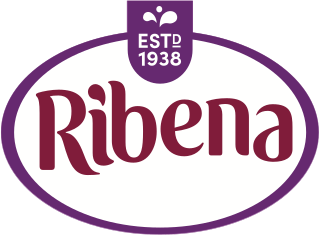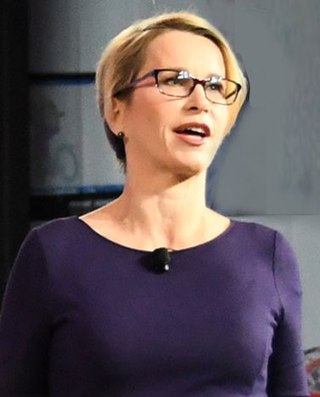
Ribena is a brand of blackcurrant-based soft drink, and fruit drink concentrate designed to be mixed with water. It is available in bottles, cans and multi-packs. Originally of English origin, it was produced by the pharmaceutical company GlaxoSmithKline (GSK) until 2013, when the brand was sold to Japanese beverage conglomerate Suntory.

GSK plc is a British multinational pharmaceutical and biotechnology company with global headquarters in London. It was established in 2000 by a merger of Glaxo Wellcome and SmithKline Beecham, which was itself a merger of a number of pharmaceutical companies around the Smith, Kline & French firm.

Horlicks is a British sweet malted milk hot drink powder developed by founders James and William Horlick. It was first sold as "Horlick's Infant and Invalids Food", soon adding "aged and travellers" to their label. In the early 20th century, it was sold as a powdered meal replacement drink mix.

Geritol is a United States trademarked name for various dietary supplements, past and present. Geritol is a brand name for several vitamin complexes plus iron or multimineral products in both liquid form and tablets, containing from 9.5 to 18 mg of iron per daily dose. The name conveys a connection with aging, as in "geriatric". The product has been promoted from almost the beginning of the mass media era as a cure for "iron-poor tired blood".
Lucozade is a British brand of soft drinks and energy drinks manufactured and marketed by the Japanese company Suntory. Created as "Glucozade" in the UK in 1927 by a Newcastle pharmacist, William Walker Hunter, it was acquired by the British pharmaceutical company Beecham's in 1938 and sold as Lucozade, an energy drink for the sick. Its advertising slogan was "Lucozade aids recovery". It was sold mostly in pharmacies up until the 1980s before it was more readily available as a sports drink in shops across the UK.

Brockham is a village and civil parish in the Mole Valley district of Surrey, England. It is approximately 1.5 miles (2.4 km) east of Dorking and 4 miles (6.4 km) west of Reigate. The village lies south of Box Hill, with the River Mole flowing west through the village. At the 2011 census, it had a population of 2,868.

Ticarcillin is a carboxypenicillin. It can be sold and used in combination with clavulanate as ticarcillin/clavulanic acid. Because it is a penicillin, it also falls within the larger class of β-lactam antibiotics. Its main clinical use is as an injectable antibiotic for the treatment of Gram-negative bacteria, particularly Pseudomonas aeruginosa and Proteus vulgaris. It is also one of the few antibiotics capable of treating Stenotrophomonas maltophilia infections.

Beecham's Pills were a laxative first marketed about 1842 in Wigan, Lancashire. They were invented by Thomas Beecham (1820–1907), grandfather of the conductor Sir Thomas Beecham (1879–1961). The British pharmaceutical firm, established in 1859 as Beechams, became a global brand, and in the year it was founded produced the first advertising slogan.

Smith, Kline & French (SKF) was an American pharmaceutical company.
Reliant Pharmaceuticals was a company purchased by GlaxoSmithKline in December 2007 for $1.65B. Co-founded by Joseph J. Krivulka.
GlaxoSmithKline Pakistan is a Pakistani pharmaceutical company which is a subsidiary of British company GSK. It is the largest pharmaceutical company in Pakistan.

Block Drug Company was a pharmaceutical company based in Jersey City, New Jersey, United States, that specialized in dental care products. Its most popular products included Polident denture cleanser, Poli-Grip denture adhesive, Dentu-Creme denture toothpaste, Nytol sleeping pill, Tegrin medicated shampoo for psoriasis, Lava hand soaps, Beano and Phazyme anti-gas products, Balmex diaper rash ointments, and Sensodyne desensitizing toothpaste.
Thomas Beecham was a British businessman who founded Beechams, a large pharmaceutical business. In 1859, he focused on marketing the business by advertising in newspapers and using a network of wholesale agents in northern England and in London, rapidly building up the business. In August 1859, he created the slogan for Beecham's Pills: "Worth a guinea a box", which is considered to be the world's first advertising slogan, helping the company become a global brand.
The pharmaceutical industry in the United Kingdom directly employs around 73,000 people and in 2007 contributed £8.4 billion to the UK's GDP and invested a total of £3.9 billion in research and development. In 2007 exports of pharmaceutical products from the UK totalled £14.6 billion, creating a trade surplus in pharmaceutical products of £4.3 billion.

Study 329 was a clinical trial which was conducted in North America from 1994 to 1998 to study the efficacy of paroxetine, an SSRI anti-depressant, in treating 12- to 18-year-olds diagnosed with major depressive disorder. Led by Martin Keller, then professor of psychiatry at Brown University, and funded by the British pharmaceutical company SmithKline Beecham—known since 2000 as GlaxoSmithKline (GSK)—the study compared paroxetine with imipramine, a tricyclic antidepressant, and placebo. SmithKline Beecham had released paroxetine in 1991, marketing it as Paxil in North America and Seroxat in the UK. The drug attracted sales of $11.7 billion in the United States alone from 1997 to 2006, including $2.12 billion in 2002, the year before it lost its patent.

Dame Emma Natasha Walmsley is the chief executive officer (CEO) of GlaxoSmithKline. She succeeded Sir Andrew Witty, who retired in March 2017. Before GSK, she worked for L'Oréal for 17 years, and was a non-executive director of Diageo until September 2016. She grew up in Barrow-in-Furness, Cumbria, England.

The New Frontiers Science Park is a science park in Essex, on a redeveloped research site of GlaxoSmithKline (GSK).
Parodontax is a brand name of toothpaste and mouthwash currently owned by Haleon, previously GSK.













